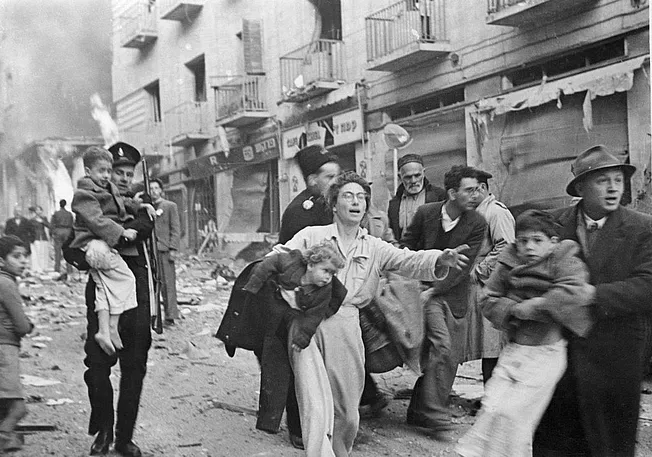My smartphone says it’s October 2023, but in Israel it feels like 1948.
That was the year this country was established as 600,000 Jews fought the combined might of the Arab world three years after the genocide in Europe. You can still feel that war in the air and underbrush of Kibbutz Mishmar Ha’emek in northern Israel, where I traveled this week, passing trucks carrying tanks and armored bulldozers south toward the battle zone around Gaza.
For Israelis, the name Mishmar Ha’emek evokes 1948—an equivalent of Valley Forge, perhaps, or Gettysburg. The kibbutz is famous for holding out against the superior forces of the Arab Liberation Army in April 1948, helping create the fighting ethos of Israel’s military and the Zionist principle that Jews will never again abandon their homes. On one edge of the kibbutz is a historic site commemorating the Palmach, the militia that helped decide the battle. Amid the trees and bushes of the peaceful cemetery here are graves of people like Moshe Formansky, 41, and Rafael Altberg, 21, killed 75 years ago in the war that created a Jewish state, and then never really ended.
I’d come here not to revisit history, but to speak to members of another kibbutz, Nahal Oz, on the Gaza border a few hours’ drive to the south—those members, that is, who weren’t killed or kidnapped by Hamas in the massacre of October 7. The evacuees have relocated here, and the locals are doing their best to house and entertain them. When I arrived, the children of Nahal Oz were indoors, squealing at a snake show arranged by volunteers. Outside, their hollow-eyed parents walked the paths. Across a lawn, a few dozen people sat shiva for a friend, Ilan Fiorentino, killed in the assault.
At first I thought the historical reference for the current horror in Israel would be the Yom Kippur War, which began 50 years earlier almost to the day, on October 6, 1973. In that war Israel was surprised by Egypt and Syria on a Jewish holiday, as was the case last week. But the year that keeps cropping up is 1948.
The slaughter and arson in Nahal Oz and elsewhere, one evacuee told me, was an attempt to “do to us what they think we did to them in 1948”—a reference to the flight of Palestinian refugees from territories that became our state. Amir Tibon, a colleague from the newspaper Haaretz, who was trapped with his wife and children in their home as Hamas soldiers tried to break in and kill them, wrote that the initial defense of the kibbutz by a handful of Border Police troops facing dozens of Hamas fighters was “the few against the many, like 1948.”
Many of the Palestinian refugees of the Arab defeat of 1948, known in Arabic as the Nakba, or catastrophe, ended up in the Gaza Strip, ruled first by Egypt, then by Israel, and then by Hamas. The Jewish refugees who created Israel built a society worth living in, but nothing similar emerged for the Arab refugees of Gaza, and they became the grandparents and great-grandparents of the murderers and rapists who descended on Nahal Oz and its environs last week. They found our army asleep behind high-tech fences and screens. Hamas slaughtered more than 1,200 Jewish civilians in cold blood, killed about 300 soldiers, and took 200 more Israelis hostage, including children, senior citizens, and entire families, recording scenes of medieval barbarism on their GoPros.
The journalist Shimrit Meir, one of Israel’s sharpest observers of the Arab world, commented several days ago that the Hamas operation was greeted in Gaza with “unprecedented euphoria” at “the greatest Palestinian breakthrough since 1948.” By the end of the week, however, with civilians in Gaza fleeing their homes amid Israeli air strikes and a looming ground invasion, that sentiment was replaced by the dawning fear of “a new Nakba”—meaning that 1948 was coming again.








